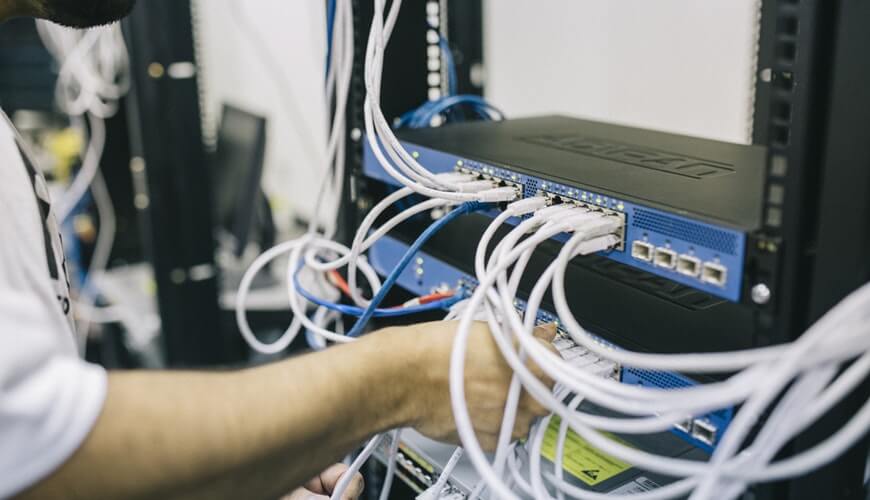Online vs. In-Person: Choosing the Right Cisco CCNA Training Method
Getting your Cisco CCNA (Cisco Certified Network Associate) certification is a big step toward moving up in the networking field. But one very important choice you need to make is how you want to get your CCNA training. Should you choose the ease of online training or the more usual method of going to classes in person? Our blog will talk about the pros and cons of both online and in-person Cisco CCNA training so that you can make an informed decision that fits your needs and the way you learn best.
Online Cisco CCNA Training
Pros:
- Freedom: There is no greater freedom than with online training. You can get to the course materials and lessons whenever it works for you. This is great for people who have full-time jobs or busy lives and need to study around other obligations.
- Cost-effectiveness: Most of the time, online training costs less. You can spend less on things like transportation, housing, and training materials. There are a lot of free online tools and practice tests that you can use.
- Online CCNA classes let you learn at your own pace, so you can do them whenever you want. You don’t have to wait for other ideas to sink in if you understand some quickly. On the other hand, you don’t have to feel rushed if you take more time to understand difficult topics.
- A Lot of Different tools: The Internet is full of great tools for getting your CCNA. There are video tutorials, forums, and practice tests that can help you learn more and go beyond what you’re learning in class.
- Receive from anywhere in the world: You can receive online training from anywhere in the world. It doesn’t matter where you live; you can choose to learn from top teachers or schools.
Cons:
- Not being able to talk to other people in person: Online training can make you feel alone. If you don’t meet your teachers and classmates in person, you miss out on the chance to ask questions and make connections.
- Self-Discipline: You need to be self-disciplined and driven to do well in online training. When you study by yourself, it’s easy to put things off or lose focus.
- Less hands-on experience: Online classes can look like real-life situations, but they might not give you as much hands-on experience as training in a physical lab.
In-Person Cisco CCNA Training
Pros:
- Face-to-Face Instruction: When you go to training in person, you can talk to instructors directly and ask questions. You can also get comments right away. This can help you understand things that are hard to explain.
- Controlled Learning Environment: Classrooms provide a controlled learning environment that can assist some students in remaining focused and organized.
- Hands-On Labs: When you go to training in person, you can often do hands-on labs where you can practice setting up and fixing networking equipment. This hands-on training is very useful in the real world.
- Opportunities to network: In a classroom, you can network with other students, teachers, and people who work in the field. Building a network of contacts can help you get better job chances in the future.
- Support and friendship: Going to classes in person helps people feel supported and friends with each other. You can learn with other people, talk about your experiences, and keep each other going.
Cons:
- Set plan: There is a set plan for in-person training, which might not work for people who have full-time jobs or other obligations. Not going to class can be a big problem.
- Limitations due to location: in-person lessons can only be held in certain places. To get the training you want, you might have to travel or move. This can really make things hard for some people.
- More money: Training that takes place in person usually costs more. You need to think about how much the course materials, tuition, and journey will cost.
- Less flexibility: In a real classroom, you don’t have as much power over how fast you learn. The school decides what the course covers and when it meets.
- Dependence on the Quality of Instructors: The best way to learn in a real-life class is with a teacher who is knowledgeable and good at teaching. A teacher who isn’t very good can slow you down.
Making the Right Choice
It’s up to you to decide whether to get Cisco CCNA training online or in person. It depends on how you learn, your situation, and your goals. When making your choice, here are some things to think about:
- Your Learning Style: Are you a self-motivated, organized student who does well in an online setting, or do you need more structure and direction in a classroom?
- When it comes to time and freedom, can you stick to a set plan, or do you need to be able to study at your own pace?
- Make a budget. Think about how much you can spend on your CCNA training and how much money you have available.
- Location: Are you close to a good training center, or would you have to drive to take classes in person?
- Hands-On practice: How significantly does having hands-on practice in a lab setting help you learn?
- Chances to network: Do you want to make professional connections in the field? If so, do you think in-person training will give you more chances to network?
Conclusion
The pros and cons of both online and in-person Cisco CCNA training are different. At the end of the day, the decision depends on your own needs and preferences. Online training is great for people who need to be flexible and save money, but in-person classes are better because you can talk to other people, do hands-on projects, and network. No matter which method you choose, know that your success in CCNA training depends on how hard you work at learning. Carefully think about your choices and pick the one that fits your learning style and job goals the best. You will be glad you got your Cisco CCNA certification training no matter what way you do it.


2 thoughts on “Online vs. In-Person: Choosing the Right Cisco CCNA Training Method”